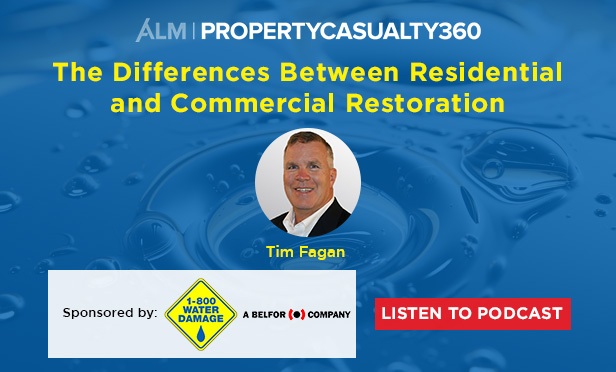Water events such as flooding and burst pipes put policyholders in the difficult position of needing claims support. They also account for 30% of claims. The experience an insured has during this process often determines whether they become a loyal customer or switch to a competitor. When dealing with a large event such as a hurricane, the stakes are even higher.
"During severe weather events, there are just too many phone calls and losses happening within a short period," says Bill Gordon, regional business coach at 1-800 WATER DAMAGE. "To provide policyholders with the best possible claims experience, it's important to staff up to manage those volumes and maintain high communication standards."
 Bill Gordon, regional business coach at 1-800 WATER DAMAGE
Bill Gordon, regional business coach at 1-800 WATER DAMAGE Balancing policyholder experience with keeping costs in check can be challenging, and insurers work hard to achieve this balance. However, focusing on a few key areas can improve efficiency and experience during high spikes in claims volumes.
Recommended For You
Key areas to optimize water claims efficiency
Early communication about claims coverage and policy limits can help set insureds' expectations. It can also prevent misconceptions that can slow claims and create retention challenges.
Strong claims documentation is also critical for both efficiency and retention, notes Ken Davis, claims partnership manager at BELFOR Franchise Group, the parent company of 1-800 WATER DAMAGE. "The more documentation, the better," he explains, and says that collecting in-depth documentation around a loss supports faster processing and reduces miscommunications between policyholders and insurers.
 Ken Davis, claims partnership manager at 1-800 WATER DAMAGE
Ken Davis, claims partnership manager at 1-800 WATER DAMAGE During high-loss situations, Gordon has also seen success through empowering local agents with draft authority for smaller losses. This strategy frees up claims adjusters to focus on larger and more complex losses.
When considering water-related emergencies, a common area of policyholder confusion is the need to get multiple restoration bids. Letting insureds know this isn't necessary during an emergency can help expedite restoration, mitigate losses, and improve claim efficiency.
Tenured adjusters retire, creating challenges
As insurance companies refine processes around increased claims volume, many are also managing an increased number of tenured adjusters reaching retirement age. Replacing that level of expertise, especially around water claims, can be challenging. That's why working with an experienced restoration partner is helpful. Davis notes that some partners offer resources to support adjuster education and training.
"We have a dedicated training facility to support insurance adjuster training around water-related claims, including in-person and online options," says Davis. "Our Ann Arbor facility has a certified two-story flood house, a stand-aside kitchen and bathroom, and other hands-on training resources."
With the increasing intensity of natural disasters, such as hurricane events, the need for greater efficiency in processing water claims will only grow. Proactively targeting strategies in this area helps insurers close claims quickly, keep policyholders satisfied, and reduce retention issues.
For more insights from the 1-800 WATER DAMAGE team of experts, click here.
To learn more about the insurance adjuster training programs offered by the experts at BELFOR Franchise Group, click here
For more insights on water damage claims or for more information on their Claim's Partnership Training.
© 2025 ALM Global, LLC, All Rights Reserved. Request academic re-use from www.copyright.com. All other uses, submit a request to [email protected]. For more information visit Asset & Logo Licensing.








